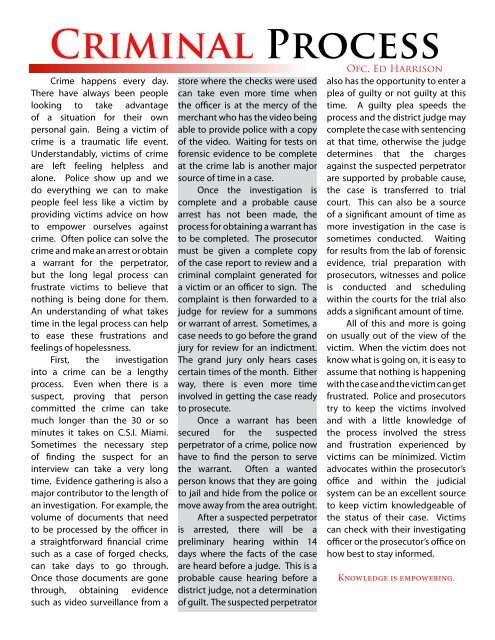2012 annual report - Ashland Police Department
2012 annual report - Ashland Police Department
2012 annual report - Ashland Police Department
You also want an ePaper? Increase the reach of your titles
YUMPU automatically turns print PDFs into web optimized ePapers that Google loves.
Criminal ProcessCrime happens every day.There have always been peoplelooking to take advantageof a situation for their ownpersonal gain. Being a victim ofcrime is a traumatic life event.Understandably, victims of crimeare left feeling helpless andalone. <strong>Police</strong> show up and wedo everything we can to makepeople feel less like a victim byproviding victims advice on howto empower ourselves againstcrime. Often police can solve thecrime and make an arrest or obtaina warrant for the perpetrator,but the long legal process canfrustrate victims to believe thatnothing is being done for them.An understanding of what takestime in the legal process can helpto ease these frustrations andfeelings of hopelessness.First, the investigationinto a crime can be a lengthyprocess. Even when there is asuspect, proving that personcommitted the crime can takemuch longer than the 30 or sominutes it takes on C.S.I. Miami.Sometimes the necessary stepof finding the suspect for aninterview can take a very longtime. Evidence gathering is also amajor contributor to the length ofan investigation. For example, thevolume of documents that needto be processed by the officer ina straightforward financial crimesuch as a case of forged checks,can take days to go through.Once those documents are gonethrough, obtaining evidencesuch as video surveillance from astore where the checks were usedcan take even more time whenthe officer is at the mercy of themerchant who has the video beingable to provide police with a copyof the video. Waiting for tests onforensic evidence to be completeat the crime lab is another majorsource of time in a case.Once the investigation iscomplete and a probable causearrest has not been made, theprocess for obtaining a warrant hasto be completed. The prosecutormust be given a complete copyof the case <strong>report</strong> to review and acriminal complaint generated fora victim or an officer to sign. Thecomplaint is then forwarded to ajudge for review for a summonsor warrant of arrest. Sometimes, acase needs to go before the grandjury for review for an indictment.The grand jury only hears casescertain times of the month. Eitherway, there is even more timeinvolved in getting the case readyto prosecute.Once a warrant has beensecured for the suspectedperpetrator of a crime, police nowhave to find the person to servethe warrant. Often a wantedperson knows that they are goingto jail and hide from the police ormove away from the area outright.After a suspected perpetratoris arrested, there will be apreliminary hearing within 14days where the facts of the caseare heard before a judge. This is aprobable cause hearing before adistrict judge, not a determinationof guilt. The suspected perpetratorOfc. Ed Harrisonalso has the opportunity to enter aplea of guilty or not guilty at thistime. A guilty plea speeds theprocess and the district judge maycomplete the case with sentencingat that time, otherwise the judgedetermines that the chargesagainst the suspected perpetratorare supported by probable cause,the case is transferred to trialcourt. This can also be a sourceof a significant amount of time asmore investigation in the case issometimes conducted. Waitingfor results from the lab of forensicevidence, trial preparation withprosecutors, witnesses and policeis conducted and schedulingwithin the courts for the trial alsoadds a significant amount of time.All of this and more is goingon usually out of the view of thevictim. When the victim does notknow what is going on, it is easy toassume that nothing is happeningwith the case and the victim can getfrustrated. <strong>Police</strong> and prosecutorstry to keep the victims involvedand with a little knowledge ofthe process involved the stressand frustration experienced byvictims can be minimized. Victimadvocates within the prosecutor’soffice and within the judicialsystem can be an excellent sourceto keep victim knowledgeable ofthe status of their case. Victimscan check with their investigatingofficer or the prosecutor’s office onhow best to stay informed.Knowledge is empowering.


